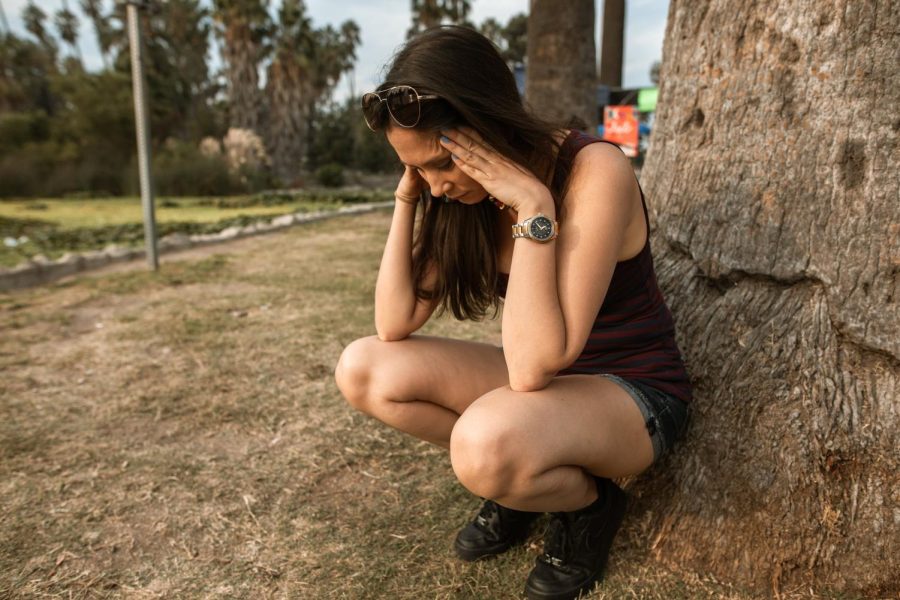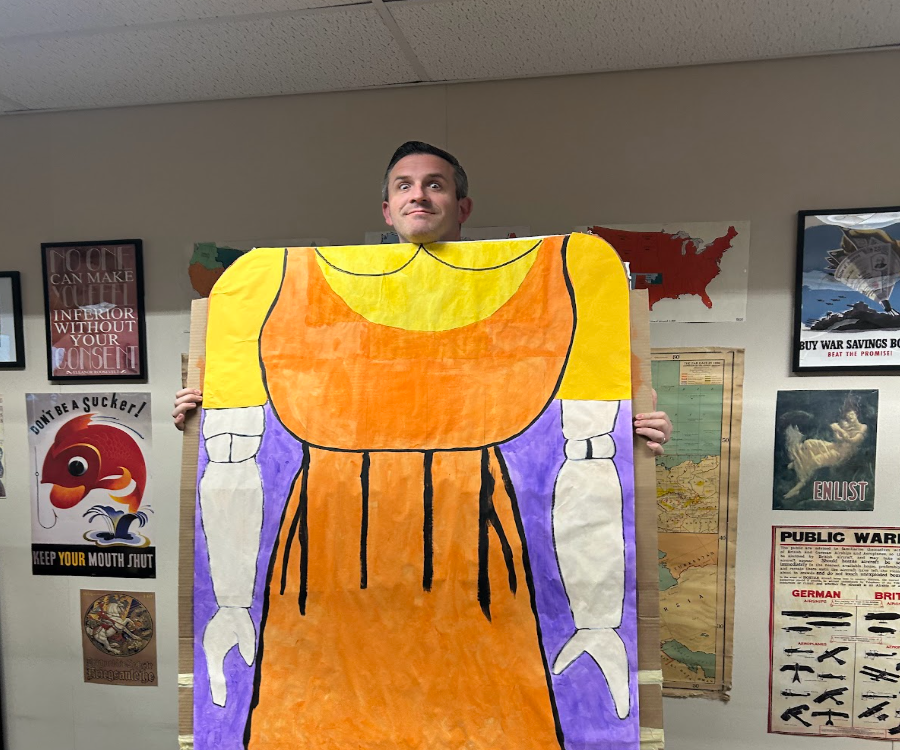How Anxiety Changes Lives: An Insider Perspective
Students from Enochs offer their own stories, advice, and tips about their experiences with anxiety.
January 24, 2023
Gen Z growing up and becoming old enough to use their own voice on behalf of themselves has resulted in society becoming more accepting of mental health issues and how it affects us. As a result, there’s been a lot of people stepping into the spotlight and opening up about their different struggles with mental health.
Arguably one of the most misunderstood mental health issues is anxiety.
Anxiety comes with a lot of stigmas. People don’t understand how severe anxiety can be and how damaging it is until they go through it. Like most mental health issues, anxiety has its wide range from having test anxiety to having anxiety wherever you become so paranoid you can’t do daily functions or even stay in class.
One in five people struggles with mental health issues. Our school has relatively 2,500 hundred students, which means that out of those 2,500 students, at least 500 of them struggle with mental illness. I was lucky enough to get the chance to talk to three people who struggle with anxiety and were willing to share their stories with us to bring more awareness to the illness.
A lot of people deal with anxiety without getting treatment for it or seeking help, which nine times out of ten is more harmful than helpful.
A student at Enochs, who was kind enough to share their story but wishes to remain anonymous, deals with anxiety but doesn’t seek treatment for it. “Anxiety affects my everyday life by preventing me from being able to do simple tasks which I used to be able to do before. If I try to do them now I’ll start to get a panic attack.” Whenever they start to feel anxious or they feel a panic attack coming on, they cope by listening to music or watching YouTube videos while taking deep breaths.
“Some stigmas of anxiety that aren’t true are that anxiety is easy to get rid of, that it’s caused by a specific event or experience, or that it’s a cry for attention. Sometimes when people start to feel their anxiety build up they don’t know what’s wrong or what’s triggering their anxiety. Although there are some coping mechanisms that can help people’s anxiety not be so severe, there’s not a clear answer or coping skill that can solve people’s anxiety and make it go away completely.” The student said.
“Some advice would be that I know anxiety can be really difficult to deal with at times and you may feel alone; I know that doctors or parents may think that you’re being dramatic about your condition, but I want you to know that your feelings are valid. Anxiety is an everyday battle but you should know that things do get better. Knowing that you’re not alone and getting help from others who also suffer from anxiety, you can figure out what helps you and hopefully reduce some of your symptoms.”
Some people suffer from anxiety that’s so severe they have to be on medication to try and make their anxiety have less of a hold on their life.
Another student who is diagnosed with an anxiety disorder so severe that they had to be put on medication to try and help their anxiety said that “anxiety is unfortunately a huge part of my daily life.” The student commented.
“From the moment I wake up to the moment I fall asleep, I have a constant dread and fear. I’ll look at things around me on the way to school and think ‘Something’s missing. Something’s not right. Something is wrong.’ and other negative things like that. Though my anxiety is especially bad at night. I often go days with only 3 hours of sleep at most because I am too afraid to sleep. When I tell people that they often laugh and ask if I’m scared of the dark, but no, I am scared of waking up. Having to start a new day is one of my biggest fears, though it’s really hard to describe how. I think it has something to do with the comfort my room holds, or maybe it’s my brain trying to give me time before I get more anxious the next day.”
This student’s struggles span beyond their daily actions, it impacts their sleep patterns as well, disrupting all areas of their life. “I’m not really sure why but I can definitely say that I am terrified of waking up. Loud, sporadic sounds with quick decibel changes cause me an unbelievable amount of stress. When many people with different voices talking at the same time at different decibels or when someone with a high-pitched voice yells my body just starts shaking uncontrollably. I’m sure everyone knows the basic “deep breaths” or any other “skills” you’d hear from a therapist, but personally, those don’t work for me.”
The student has had to work to find coping skills that work to calm their own anxiety, even if only for a moment. “I found that closing my eyes and covering my ears works really well. When I get anxiety attacks my senses can pick things up easier, which only overwhelms me more. If things are really loud around me, I like to hum and rock myself back and forth if I can. Keeping my body busy distracts me a bit from the anxiety.”
Luckily, because of the severity of this student’s anxiety, they have been able to reach out and get help through prescribed medication. “The current medication I am taking is hydroxyzine (or Vistaril) which is kind of a magic pill that for some reason gets prescribed to people with SUPER different issues. It’s often used to make people sleepy, make people less nauseous, and even treat skin rashes. This is the only medication I have ever taken for my anxiety so I have nothing to compare it to, though I feel as if nothing has changed. This medication has really no direct effects on the amount of anxiety that I feel, but it does make me sleepy. My psychiatrist prescribed me this medication because of my fear of sleeping, basically the idea of ‘no anxiety if you are asleep’.
“So far I can say genuinely that this medication has little to no effect on me besides drowsiness. As I mentioned before, I really hate when people say ‘take a deep breath’ or ‘calm down’, and I’m sure a lot of other people hate it too. While I’m sure breathing helps some people, I find that taking deep breaths stresses me more. There are millions of thoughts running through my head and I don’t need to add manual breathing to that stress.”
While different techniques will work for different people, the student shared their own perspectives on what you can do when you or someone you know is struggling with anxiety or experiencing an anxiety or panic attack. “Try saying ‘you will be ok’ or any other positive affirmations to yourself or others.”
“Another super annoying stigma is the assumption that all anxiety is due to mental disorder, which is completely false. There are many different types of anxiety but the most common one is general anxiety (different from a generalized anxiety disorder), it happens when you are anxious in different situations like going to the doctor, taking a test, or even trying new things. Having anxiety to this degree is completely normal and isn’t a huge issue. Anxiety becomes a problem when it begins to become disordered” the student shared. “There are many different types of disordered anxiety like having a phobia or having OCD. Anxiety becomes disordered when you are in a constant state of worry and can’t function normally because of it.”
The student, who has experienced all the highs and lows of anxiety, expresses the importance of knowing you are not alone in experiencing an anxiety disorder. “I’d like to tell people with anxiety that even if you feel like you are dying, I promise you aren’t. Try finding something you find comfort in like a happy place or a comfort blanket. I have a song I listen to every time I feel an anxiety attack coming. It’s silly but my cat really helps me calm down. He gets extra cuddly when I’m not feeling well and he never complains when I hug him for too long.”
Anxiety comes in many forms, and as the student shares, “Some people who have the most severe case of anxiety have to be hospitalized at one point. Not a lot of people really think that anxiety can be this severe. When someone says the word anxiety people mainly think about test anxiety, but as we’ve learned so far that’s not always the case.”
Another student at Enochs who also wishes to remain anonymous has anxiety so bad that earlier this year they had to be put in a mental institution because of the toll it was taking on them.
“Growing up in a household that puts a lot of emphasis on certain beliefs, it would always give me anxiety if I didn’t live up to them. Growing up I always had good grades and straight A’s, except for this year at the beginning of the year; and my grades started dropping more and more because I didn’t know what was going on this year. My anxiety rose up and I felt a touch on my shoulder, and I started hearing voices, and it’s always putting myself down most of the time and telling me that I can’t really do much, and after a while that builds up more and more and when you can’t really express yourself it just explodes.” The student explained.
“When it explodes I start running out of the room and I’m on the staircase crying and no one really knows what’s going on. Severe anxiety always comes from somewhere. For me it was bringing honor to my family and wanting to provide has always been my biggest priority, and feeling like I can’t even do a basic task builds up and it explodes to a point where I can’t even comprehend it and it goes from fear, to sadness, to anger, and then when you feel numb you feel like you don’t want to deal with anything anymore.”
They described anxiety as, “It’s like cycling through and you’re just stuck in your own head and you’re just talking to yourself. Some of my teachers were understanding but some also weren’t. Reaching out and trying to get them to work with me was also kind of hard. For me, it was hard to find the motivation to do anything after school. When I would get home from school all I would do is sleep and try and eat.”
Not all families are accepting or helpful when it comes to dealing with mental health, as the student shared, “Whenever I tried to talk about my feelings in my family it was very taboo and my parents would always tell me I’m fine and I’m doing good. Eventually, I just hit the point where I didn’t want to deal with this anymore.”
The student vulnerably shared why they had to stay in the mental hospital, after reaching their breaking point. “My plan was to go on the roof of this building and just end it right there. But before I could enter the building this homeless man stopped me and talked me out of it and turned me in to the police. I was transferred from a mental hospital from there and was rehabilitated.
“In the mental institution, you were really isolated, for the most part, you were just stuck in your room for the whole time except for a few hours out of the day when you would be with the other people in the institution. For me it wasn’t really scary because I kind of like being alone, I liked being by myself even before I went into the mental institution, but when I was finally released and got to go outside for the first time seeing this big tree they had right outside of the building was huge for me.”
They shared what they learned from being in the mental institution, “One thing I learned from the mental institution is that building coping mechanisms to help with anxiety is huge. After I was released I started going out of the house more and working out and playing sports and that has really helped me so far. One piece of advice I want to tell people is to just breathe and know that it’ll get better soon and try to find coping mechanisms that work for you and help you.”
Anxiety can have a wide range of effects. It can make it harder for someone to go to school, or take tests, or stop us from doing things that were easy for us to do a few months ago.
Although there’s no cure or one thing you can do to prevent your anxiety as a whole, there are some things you can do to try and lessen the toll it has on you. Whether you have test anxiety or the type that makes you hear things and feel things and distracts you; you still deserve help. You still deserve to not be held back by your anxiety.
The one “big” piece of advice people always give to others who have anxiety is to breathe, and although it does help and work for some it doesn’t help as much as other coping mechanisms can for other people. Advice for anyone who is struggling with anxiety is to find an outlet where you can express yourself, find a hobby or something you can do where you don’t have to worry about other people, where you solely do it for yourself because it makes you happy and you enjoy doing it.
Try to find someone to talk to like your friends, or family, or anyone else you’re comfortable with. Keeping everything bottled up and to yourself is only going to make everything you’re going through ten times worse. Explore coping mechanisms that you think can help you. Worst-case scenario it doesn’t help, but best-case scenario it does help and you start to benefit from it.
No matter who you are or what you’re going through you deserve help, you deserve a happy and healthy life.
Fighting mental illness doesn’t make you any less of a person than someone who doesn’t fight those battles; It can even be argued that it makes you stronger than a person who doesn’t fight the battles you do. If you or anyone you know are having suicidal thoughts please reach out to someone and seek help. You don’t deserve to go through any of it alone. The suicide hotline has officially changed its number to 988 so all you have to do is type in those three numbers and you can call or even text them if you need help. There’s also a crisis hotline if you don’t want to call the suicide hotline and their numbers are 741741. You can text them at any time during the day or night and they’ll be there to help.
Remember you are loved and wanted, and you deserve help.





Edith • Jan 24, 2023 at 5:55 pm
always a banger from maria